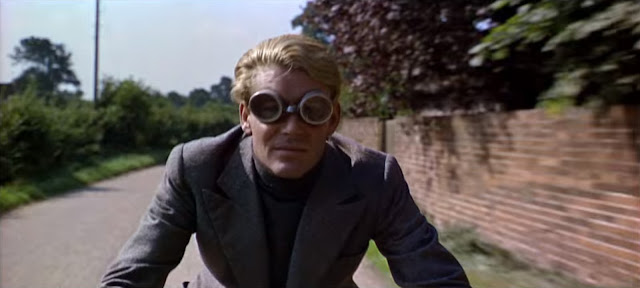 Lawrence of Arabia (1962), directed by David Lean, written by Robert Bolt and Michael Wilson, based on Seven Pillars of Wisdom by T. E. Lawrence, starring Peter O'Toole, Alec Guinness, Omar Sharif, Anthony Quinn
Lawrence of Arabia (1962), directed by David Lean, written by Robert Bolt and Michael Wilson, based on Seven Pillars of Wisdom by T. E. Lawrence, starring Peter O'Toole, Alec Guinness, Omar Sharif, Anthony Quinn A good few movies that have been awarded the Best Picture and Best Director Oscars have not really aged well or have faded into obscurity whereas movies that lost to them are now considered as classics. Lawrence of Arabia is not one of those movies. It is a historical epic, narrating the life and times of T. E. Lawrence (O'Toole) when he was a British officer tasked to be a liaison between the brits and Prince Faisal (Guinness) during the 1st World War.
The movie begins with a death. We witness, rather unceremoniously, the death of Lawrence when he, after the war back in Britain, loses control of his motorbike and dies. Later, at his funeral, a reporter is trying to interview the attendees but has little success with it. From here, the story shifts back in time to WW1, where Lawrence was known to be a bit of a misfit lieutenant, who, because of his knowledge of the Arabs, is tasked by the Arab Bureau to assess Prince Faisal in his campaign against the Turks invading the area.
Against the orders of Colonel Brighton (Anthony Quayle), Lawrence advises Faisal to capture the city of Aqaba in a surprise attack. He knows that because of the hard to cross the desert, the port town is fortified heavily only against naval attacks, so with a group of brave men, he ventures forth, trusting he can convince more Arabs to join in his quest on the way. The help he gets comes in a form of the Howeitat tribe, led by Auda Abu Tayi (Quinn). The daring mission is a success and Lawrence heads to Cairo to inform of the capture of the town and is promoted a major.
After his success, Lawrence begins to use guerilla war tactics against the Turks. The world gets a bigger whiff of him thanks to an American reporter Jackson Bentley (Arthur Kennedy), who knows a winning article when he sees one. On the war front, in Jerusalem, the brass is urging Lawrence to join in the big push towards Damascus. By this point, the man shaken by the things that he has witnessed in the war, by the knowledge of what he has found himself being capable of and what has happened to him, is at first reluctant, but then agrees to join the campaign.
Lawrence recruits a group of mercenaries, more loyal to money than any cause. This army manages to take over Damascus before the Brits arrived. They find the city now ruled by a bickering council, despite Lawrence's attempts in pushing the different tribes to work together.
By this point in the war, neither the Birts nor Faisal have use for the services of Lawrence. He is promoted colonel and sent back home. The war is fought by the ideological youngster whereas the peace is brokered by the cautious elderly, as Faisal rephrasing puts it.
Lawrence is an idealist. He doesn't believe in cruelty or violence. But as the war places him under extraordinary circumstances, the kinds of he never thought he would be a part of, he finds out to what he is really capable of. He even gets disgusted when it dawns on him that he actually might enjoy killing.
The further his mission progresses, the more he begins to believe his own hubris as well. As the Arabs think him of as a sort of a prophet delivering them the promised land, he too begins to see himself as something extraordinary. A trait the British officers find somewhat troubling.
The Idealist that Lawrence is does not want to see the promise he made to the Arabs broken. But as it is with the matters of state and power, it matters very little what one man promises to another, when the genuine negotiations take place. In the end, it is the local people who stay and deal with the aftermath with Faisal doing the negotiations on their behest, wanted they it or not. A state only talks to another state. Diplomacy is what happens over the corpses laid down by the idealists. Idealists make better statues than statesmen.
One aspect of the story of Lawrence of Arabia is how idealism doesn't really work in reality. When idealism is placed against reality, it runs headfirst into a problem of reality not being as rigid as most ideals are. That is what Lawrence finds out himself as well, first hand when he sees how the politicians take over. The promises he made based on his own idealism weight very little in the grand scheme of politics. His own convictions are shaken by the things he is forced to do and endure.
And what is out there for a man like Lawrence after his usefulness for the scheme of politics has ended? I guess, it depends on how dangerous the powers that be see that person, but as it often is, he is discarded, pointed on other matters at hand. Swept aside until he is needed again if he is ever needed.
So the story begins with a death and ends with Lawrence leaving. They both signify the same thing, the end of his idealism and usefulness. Neither means he or what he did will be forgotten, it all just means, his life will be viewed through a lens after time has passed.




Comments
Post a Comment